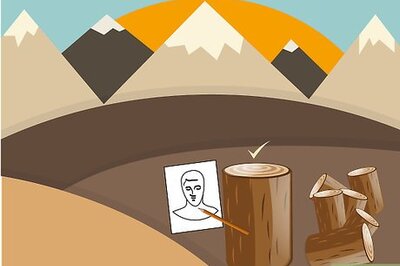
views
Like India, Turkey is a republic, and has a parliamentary democracy. The Prime Minister is the executive head of the State while the President is indirectly elected, and performs a ceremonial role. Unlike the civilized Western democratic countries, India and Turkey ejected the monarchs: Queens, Kings, Princess, and Princesses were shunted to their crannies and castles, or to get elected through the support of the people!
Having a religious group in majority, they chose to be secular: India has a Hindu majority; Turkey has a Muslim majority yet secular States.
Turkey's Justice & Development Party (AKP) was founded by Recep Tayyip Erdogan who is currently the President of Turkey. After running the country as the Prime Minister from 2003 to 2014, he did something to the republic but that awfully went against his wishes in the recently concluded parliamentary elections in June 2015.
What if Prime Minister Narendra Modi wants to become the President of India? With BJP's presence in the Parliament and in ruling in 13 states, he could get elected easily win. But he wants to get directly elected by the people of India unlike the current route of being indirectly elected by the representative of the Parliament (Lok Sabha and Rajya Sabha MPs) and the state legislatures (MLCs cannot vote in the presidential elections). Assuming he gets elected (because remnants of Modi wave springs here and there), he wants more powers but Parliament has to ratify. But in the parliamentary elections his party fails to get enough numbers! That is what had happened in Turkey, and for Erdogan who was so close to make the republic a Presidential form of government.
India and Turkey have had functional parliamentary democracies. But Turkey under Erdogan attempted to tinker with the existing system with an aim to have more powers to the Presidential Office but needed parliamentary ratification. In the parliamentary elections, his party failed to get enough numbers!
Erdogan is a popular politician of Turkey. He led AKP to successive victories since 2002 to the Parliament, and in 2014 he got elected as the President of Turkey by a direct vote securing more than 50% of total votes. He assumed his party will emerge victorious in the June 2015 elections, and the Parliament will ratify more powers to the President! AKP emerged as the single largest party failing short of simple majority. Technically, President Erdogan did not lose the elections but everyone attributes the electoral defeat to his political party. Since the elections results, Erdogan did not come out of his 1,150-room White Palace in Ankara.
The Turkish electorate gave a divisive verdict (hung Parliament): out of the four major political parties none of them had secured 276 in the Turkish Parliament called Grand National Assembly which has a total of 550 seats. Erdogan wanted 400 seats, or at least 336 to effect constitutional changes but his party secured only 258 seats. Since 1999, it was the first time that there is a hung Parliament.
The party which surprised many by its performance was People's Democratic Party (HDP) led by 42-year-old Kurdish lawyer Selahattin Demirtas. Kurds are scattered in Iran, Iraq, Syria and Turkey. Kurds are a nation without a nation state. The party sprung into mainstream far from being a party fighting for Kurds' rights. It got 13.12% of the total votes polled, and has secured 80 seats in the Parliament. It campaigned on raising the minimum wages, access to university education, gender equality, to establish a ministry of women and make International Women's Day a national holiday. The party had 50% quota for female candidates and 10% for LGBT candidates: cue for India's political parties.
Prime Minister Ahmet Davutoglu has resigned after his AKP lost its majority in parliamentary elections. The question is whether the Davutoglu, or his party will form an alliance with another political party, or will Turkey heads for a snap poll is to be seen. “The true loser of this election is Erdogan. Turkey won,” said Haluk Koc, Deputy leader of CHP Party. “Turkish President Erdogan Reeling After His Country Hands Him His Ass,” said The Young Turks (TYT). TYT is an online news show with over 1.5 billion views hosted by Cenk Uygur and Ana Kasparian.
For some Turkey may be a conservative country unable to figure out in which way it should lean: towards Europe or Islamic Asia? It's changing. For the first time, 96 women won a place in the Grand National Assembly to a historic high of 17%, compared with 14% after the 2011 elections while India has elected only 61 women MPs in 2014, and 59 in 2009.
Erdogan & Social Media:
Turkey under Erdogan had an uneasy relationship with Social Media (which was also responsible for Arab Spring) but he did no suppress his views. He dared to challenge their presence, and partially succeeded. “Twitter, Facebook and YouTube have to respect the Turkish Republic's laws,” he said on 30 March 2014 at a rally, “Turkey is not a banana republic.”
True. Turkey is not a banana republic. His retort to the European Union: “Do you have the right to take such a decision [on Turkey]? You stay silent about what's happening in France, in England and elsewhere in Europe, and you dare to take a decision on our security forces, who are exercising their duty of law enforcement against those demonstrators. You are anti-democratic… You [EU] do not respect democracy.”
Irrespective of the setback to Erdogan, he drew international attention when he steered Turkey with and without tact and diplomacy. His government banned Twitter but the Turkey's highest court intervened and lifted the ban (not a lawless country). He said: “We'll eradicate Twitter. I don't care what the international community says. Everyone will witness the power of the Turkish Republic.”
Mustafa Kemal Ataturk (in whose honour India has named a road in the national capital), the founder of modern Turkey, had placed the country on to the path of secularism and steered it away from Islamic influence unlike other Middle Eastern countries. Erdogan tilted Turkey towards Islamic Asia thus effectively failing to secure a full-membership in the European Union, but managed to have strategic relations with Russia.
Which political leader from Asia or Africa with an ounce of consciousness wouldn't have said off-the-record what Erdogan had said: “I speak openly. Foreigners love oil, gold, diamonds and the cheap labor force of the Islamic world. They like the conflicts, fights and quarrels of the Middle East. Believe me, they don't like us. …They look like friends but they want us dead. They like seeing our children die.”
Incredible achievement:
Irrespective of the electoral set back, Erdogan did a remarkable job as the Prime Minister of Turkey: surrounded by Aegean, Mediterranean and Black Seas, and bordering with Armenia, Azerbaijan, Bulgaria, Georgia, Greece, Iran, Iraq and Syria he did drag Turkey to a war nor let ISIS (Islamic State of Iraq and Syria) to ride into the country! But with the penetration of Internet, Turkey (which straddles in two continents) has a challenge to rise to meet the expectation of its citizens who know the standards in Europe and in Asia.
Lessons for India: let the parliamentary democracy sustain and flourish; and let the views be expressed on online social media.
(Kovuuri G. Reddy is the author of Handbook of Journalism and Media: India, Bharat, Hindustan)




















Comments
0 comment